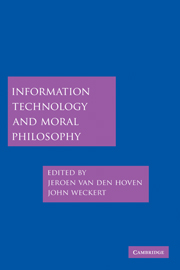Book contents
- Frontmatter
- Contents
- List of Contributors
- Introduction
- 1 Norbert Wiener and the Rise of Information Ethics
- 2 Why We Need Better Ethics for Emerging Technologies
- 3 Information Ethics: Its Nature and Scope
- 4 The Transformation of the Public Sphere: Political Authority, Communicative Freedom, and Internet Publics
- 5 Democracy and the Internet
- 6 The Social Epistemology of Blogging
- 7 Plural Selves and Relational Identity: Intimacy and Privacy Online
- 8 Identity and Information Technology
- 9 Trust, Reliance, and the Internet
- 10 Esteem, Identifiability, and the Internet
- 11 Culture and Global Networks: Hope for a Global Ethics?
- 12 Collective Responsibility and Information and Communication Technology
- 13 Computers as Surrogate Agents
- 14 Moral Philosophy, Information Technology, and Copyright: The Grokster Case
- 15 Information Technology, Privacy, and the Protection of Personal Data
- 16 Embodying Values in Technology: Theory and Practice
- 17 Information Technology Research Ethics
- 18 Distributive Justice and the Value of Information: A (Broadly) Rawlsian Approach
- Select Bibliography
- Index
- References
10 - Esteem, Identifiability, and the Internet
Published online by Cambridge University Press: 21 July 2009
- Frontmatter
- Contents
- List of Contributors
- Introduction
- 1 Norbert Wiener and the Rise of Information Ethics
- 2 Why We Need Better Ethics for Emerging Technologies
- 3 Information Ethics: Its Nature and Scope
- 4 The Transformation of the Public Sphere: Political Authority, Communicative Freedom, and Internet Publics
- 5 Democracy and the Internet
- 6 The Social Epistemology of Blogging
- 7 Plural Selves and Relational Identity: Intimacy and Privacy Online
- 8 Identity and Information Technology
- 9 Trust, Reliance, and the Internet
- 10 Esteem, Identifiability, and the Internet
- 11 Culture and Global Networks: Hope for a Global Ethics?
- 12 Collective Responsibility and Information and Communication Technology
- 13 Computers as Surrogate Agents
- 14 Moral Philosophy, Information Technology, and Copyright: The Grokster Case
- 15 Information Technology, Privacy, and the Protection of Personal Data
- 16 Embodying Values in Technology: Theory and Practice
- 17 Information Technology Research Ethics
- 18 Distributive Justice and the Value of Information: A (Broadly) Rawlsian Approach
- Select Bibliography
- Index
- References
Summary
ESTEEM, REPUTATION, AND THE ‘COMPOUNDING EFFECT’
Nature, when she formed man for society, endowed him with an original desire to please, and an original aversion to offend his brethren. She taught him to feel pleasure in their favourable, and pain in their unfavourable regard.
(Adam Smith 1759/1982, p. 116)We assume in this chapter, in line with what we have argued elsewhere (Brennan and Pettit 2004), that people desire the esteem of others and shrink from their disesteem. In making this assumption, we are deliberately associating ourselves with an intellectual tradition that dominated social theorizing until the nineteenth century, and specifically until the emergence of modern economics. That tradition includes Adam Smith, Thomas Hobbes, John Locke, the Baron de Montesquieu, David Hume – indeed, just about everyone who is recognized as a forebear of modern social and political theory, whether specifically in the economistic style or not. There is scarcely a social theorist up to the nineteenth century who does not regard the desire for esteem as among the most ubiquitous and powerful motives of human action (Lovejoy 1961). Smith's elegantly forthright formulation, offered as the epigraph to this section, simply exemplifies the wider tradition.
We can think of a minimalist version of the basic esteem relationship as involving just two individuals – actor A and an observer, B. The actor undertakes some action, or exhibits some disposition, that is observed by B. The observation of this action/disposition induces in B an immediate and spontaneous evaluative attitude.
- Type
- Chapter
- Information
- Information Technology and Moral Philosophy , pp. 175 - 194Publisher: Cambridge University PressPrint publication year: 2008
References
- 3
- Cited by

